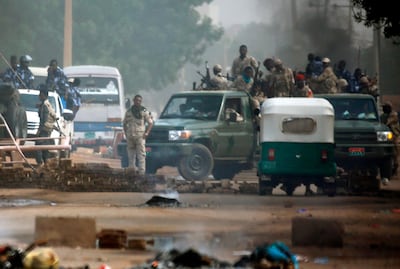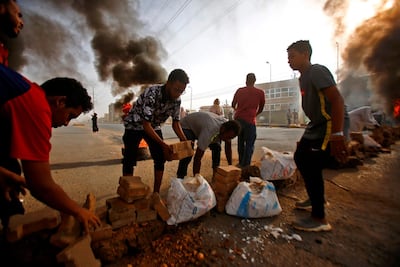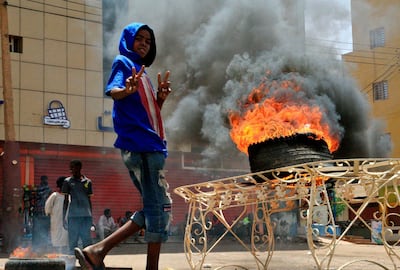Sudanese troops moved to break up a sit-in outside the army headquarters in Khartoum on Monday, killing at least 30 people and prompting protest leaders to call for "full civil disobedience" and an end to talks with the military transitional council.
Gunfire and explosions were heard across the Sudanese capital after troops blocked roads leading to the protesters' camp.
The Central Committee of Sudan Doctors said 30 people, including a child, 8, had been killed and that the military had opened fire inside the East Nile Hospital.
More than 116 people were wounded and the death toll was likely to rise, the committee said.
A coalition of civilian groups said it was halting all contact with the transitional military council.
The council took over the running of the country after the military removed president Omar Al Bashir, 82, on April 11.
The talks had reached a stalemate over the make-up of a military and civilian council to oversee a political transition.
UN Secretary General Antonio Guterres condemned the "excessive use of force by security personnel" and called for an independent investigation into the deaths.
Mr Guterres said he was alarmed by reports that security forces had opened fire inside a hospital.
"What is clear to us is that there was use of excessive force by the security forces on civilians," said Stephane Dujarric, spokesman for the UN chief. "People have died. People have been injured."

Activists said the raid was an attempt to disperse the sit-in that began about a week before the military removed Mr Al Bashir. The military said it was to clear the area of "criminal elements".
"The protesters holding a sit-in in front of the army general command are facing a massacre in a treacherous attempt to disperse the protest," the Sudanese Professionals Association said after the raid began, urging compatriots to come to their aid.
Activists reported slowing internet speeds, raising fears of communications blackout. The association called for the communications networks to stay open.
After morning prayers, gunfire cracked
The military attacked shortly after morning prayers as protesters at the sit-in were going to sleep, activists told The National.
Troops including those from a paramilitary group began firing live ammunition and tear gas into the crowd, and beating protesters with sticks.
After clearing the area, they burnt demonstrators' tents and broke into people’s homes to arrest them, the activists said.
Dozens of citizens fled the square as smoke rose above Khartoum and tyres burned in the streets. Dozens of military trucks patrolled the city's neighbourhoods.
“It is really awful, it was a bloody morning,” said Marwan Osman, a protester and member of the association.
Mr Osman said hundreds of people were injured, with the Royal Care Hospital receiving 60 wounded.
“They are behaving the same as the old regime. The old regime is still here,” he said.
“We feel like we’ve been forced back to square one, to where we were in December," when the protests against Mr Al Bashir began.
Prof Mohammad Al Khair of Alzaiem Alazhari University said protesters were determined to continue the fight for a civilian-led government.
“The sit-in is only one weapon of resistance," Prof Al Khair said. "The military council has silenced one weapon but there are more.”
Civilian leaders cut ties with military
Protest leaders said the raid had ended talks between the military and civilians, and called for civil disobedience across the country. But the military said it wanted talks to resume.
"We will confront it by escalating protests, marches and full civil disobedience," said Khalid Yousef, a leader of the Declaration of Freedom and Change Forces.
The professionals association called for a general strike and mass protests to close roads and bridges. Protesters have blocked roads with stones, bricks and burning tyres in Khartoum.

In Omdurman, Khartoum's twin city, thousands of people have blocked roads with stones and burning tyres, Reuters reported.
There were no security forces in area, which sits on the other side of the Nile River from Khartoum.
Protests groups urged medical personnel to rush to Khartoum's hospitals and called for blood donations.
The military council told Sky News Arabia the raid was focused on "criminal elements" near the protest site and that demonstrators would be allowed to return.
"We did not disperse the sit-in by force," said Shamseddine Kabbashi, spokesman for the council. "The tents are there and the youths are moving freely."
The council is committed to talks and was ready to hold a meeting soon, Mr Kabbashi said.
Condemnation from diplomats
The US embassy in Khartoum said in a tweet that has since been deleted that the military council "cannot responsibly lead the people of Sudan". It reposted the tweet, condemning the attacks.
The UK's Foreign Minister, Jeremy Hunt, said the attack was "an outrageous step that will only lead to more polarisation and violence".
"It will not help Sudan build the future the people are demanding," Mr Hunt said. "The military council bears full responsibility for this action and the international community will hold it to account."
The EU called for a democratic transition.
"We call on the transitional military council to act responsibly and respect people's right to express their concerns," an EU spokeswoman said.
"The European Union's priority remains the rapid transfer of power to a civilian authority."
The British ambassador in Khartoum, Irfan Siddiq, tweeted: "This. Must. Stop. Now."
Travel disruptions
The violence prompted several airlines to cancel flights to Sudan.
Emirates announced on Monday afternoon that its flights to Khartoum had been suspended.
"Operations of Emirates flights to and from Khartoum on June 3 are suspended due to political unrest in Sudan," the airline said on its website.
"In addition, flights operated by our codeshare partner flydubai to and from Khartoum and Port Sudan have been cancelled.
"We are monitoring the situation closely and aim to give customers as much notice as possible if there are any further changes to our operations."
Passengers transiting through Dubai to Khartoum would not be allowed to board the first leg of their journey, Emirates said.
Those with tickets booked can contact their local Emirates office for more information.
Omani airline Salam Air told The National it had cancelled all flights to Khartoum and informed its passengers.
Ethiopian Airways said it operated one flight to Khartoum on Monday but cancelled two later ones and was monitoring the situation to decide when normal services could resume.
A key source of information under threat
Reports of a slower internet connection have raised fears that the key form of communication among the opposition would be cut.
The professionals association and other pro-democracy groups have used tweets to share statements, calls to action and moral support.
Twitter has also been used to locate missing friends and family. Activists have posted lists of wounded protesters admitted to Khartoum’s hospitals.
Arabic hashtags that translate to Military Massacre and Ramadan Massacre in English have helped to spread photos and videos of the clashes.
Omar Al Bashir overthrown
The sit-in has lasted weeks as civilians and military officials argued over the make-up of a transitional government.
The military council had said it would not use force to disperse the protesters and has not issued a statement about Monday's raid.
Civilians insisted on a majority in the 11-seat council and lead the body, while the military wanted it to be led by a general.
Protesters insist no elections should be held before three years so that civilian leaders can dissolve all social and political networks of Mr Al Bashir's old party and purge state institutions.
Last week, the protesters held a two-day general strike seeking to strengthen their hand in the negotiations.

















